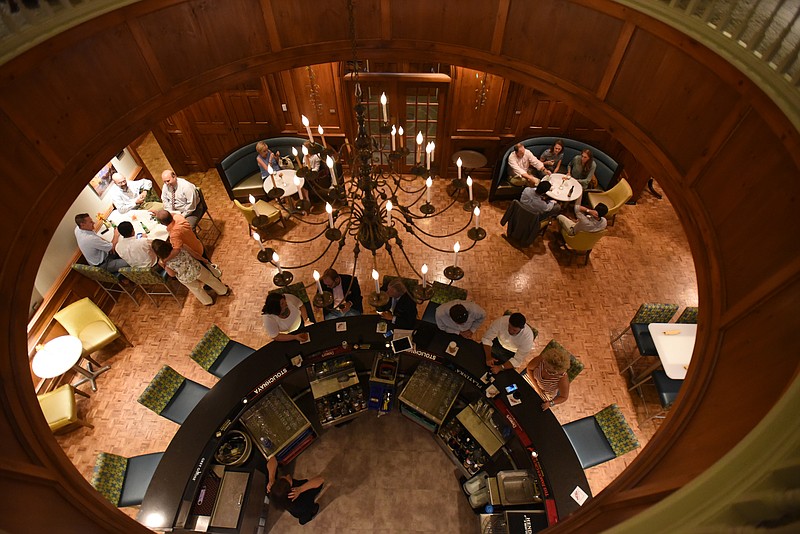Two years ago, the Mountain City Club was on its last legs. Today, membership is booming, with more than 100 new members signed up since then.
But in order to survive, the storied club had to change. In the face of shifts in how young professionals approach their lives, the old ways simply weren't cutting it.
Like at many private business clubs, membership at the Mountain City Club was falling, revenue from dues was declining, and new blood was in short supply. At a low, the club hit just 240 dues-paying members.
The club was having an identify crisis. What purpose could a bunch of wood-paneled rooms stuffed with leather armchairs serve as millennials and young professionals increasingly turn to coffee shops, bars and work-from-home arrangements that don't charge a monthly fee?
"There's a big conversation in America right now, and the topic is whether there is a place for a city club anymore," says Bob Franklin, president of the Mountain City Club. "That's the big question, is whether there is still a market for that."
Professional clubs like the Mountain City Club or the Walden Club are traditionally designed for the 9 to 5 crowd. They're built to appeal to established professionals who take predictable lunch breaks and prefer to go out for a quiet after-dinner cocktail with business colleagues. They aren't geared toward the bohemian young professionals of today who seem to place a higher value on unusual work hours, craft beers and open mic nights.
"A lot of folks thought we were going out of business," Franklin says.
In fact, the Mountain City Club discussed a merger with the Walden Club, and a proposal was put to a vote in which both clubs would move into the Walden Club space at the top of the Republic Centre. But the members of the Mountain City Club voted it down, Franklin says.
"They said thanks, but no thanks," he says.
So Franklin had to come up with a better way to maintain the established club - which counted well-known city fathers like Adolph Ochs, Samuel Patton and Harry Scott Probasco among its founding members in 1889 - as a going concern.
The first challenge was to change the club's image as an old white men's club. This wouldn't be cheap or easy, so Franklin had to confront members with the choice they now faced: Either pony up the cash for some renovations and get ready for some changes in order to bring the club into the 21st century, or face an inevitable decline.
"I told them it's got to change or it's gonna die," he says.
The members agreed. They started by looking around at what interested the young members they were trying to attract. Young professionals seemed amenable to paying for communal work spaces in places like Society of Work, participating in business incubators or working out of coffee shops, so they began with that idea.
More than $500,000 in renovations reinvented the club's second floor, transforming it into a business center complete with free Wi-Fi and quiet work spaces. The club turned its inert foyer into a lively lobby and bar area, turned unused card rooms into business meeting rooms with smart technology, and worked to cultivate a new atmosphere that mixed old and new. They repainted walls, brought in updated furniture and began rotating in new local artwork. But more than a new coat of paint, the club needed to get the word out that things were not as they once were.
"We have not discriminated in 30 years, but people still ask, 'I'm a woman, I'm Jewish, I'm Catholic, would I be welcome?,'" Franklin says. "Of course, all are welcome. You've got to become welcoming to every race, every gender."
They also had to make it affordable for price-conscious young professionals who had entered a workforce rife with uncertainty caused by recession. The prices are now $45 per month for members age 21 to 29, $90 per month for members age 30 to 39 and $180 per month for members 40 and older.
When you factor in the free Wi-Fi and coffee, general manager Joe Fidelibus says it's a pretty good deal for someone looking for a great place to do business and have meetings.
"If you're in your 20s or 30s and you work downtown and you don't try us out, you're making a mistake," he says.
But even with all the improvements, Franklin says he still faced a lot of pushback. Millennials don't join exclusive clubs, he was told. They don't go for the plush atmosphere and the quiet lunches. It will never work.
As he tells the story, he nods over to a table to his right.
"But those are three young insurance agents over there who love coming here," he says.
In fact, of the more than 100 new members, 30 are in their 20s and another 30 are in their 30s, he says, pointing to a bulletin board with several new young prospective members. Membership is limited to 685, and they're more than halfway there, Franklin says.
"Everyone has a third place," Franklin explains. "You've got work, you've got home, but you've got to have a third place. If I come down here with a laptop, I can answer emails, drink coffee and have a meeting, and if I get hungry I can have a bite to eat."
To be sure, there are still some vestiges of the Mountain City Club of old. While there's a men's locker room, there's not yet a women's locker room. Franklin plans to add that when he expands the fitness facility. And there's still a long way to go in filling out the club's membership rolls.
As it continues to evolve, Franklin says the club still meets its basic goal of being a great place to have a business lunch.
"The reality is, this is a place where you can actually hear yourself having a conversation at lunch," Franklin says. "It's a quiet place to find some solace."

